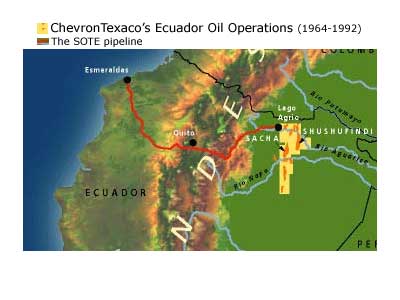Rafael Correa of Ecuador, who won a third term this year, has significantly improved the lives of his people, reducing poverty rates and building out infrastructure. Correa, an economist trained at the University of Illinois, has a nuanced view of the US, but he has had significant frictions with the behemoth of the North, which has often thrown its weight around on behalf of US corporate interests in the South American country. Correa complains of continual US push-back against policies that benefit the people, saying that Washington has been ‘Historically Antagonistic’ to progressive change in Latin America. Since most Americans can’t find Ecuador on the map and have no idea of the history of the US corporations with that country, we could review a few little blemishes on our record that might make Correa willing to offer asylum to US whistleblowers:
According to the Christian Science Monitor, an Ecuadoran court found Texas oil giant Texaco (now part of Chevron) guilty dumping “18 billion gallons of toxic wastewater and 17 million gallons of crude oil” in the Amazon basin in the northeast of the country. It was found guilty of “polluting an estimated 1,700 square miles of rain forest – an area the size of Rhode Island.” Further legal proceedings are ongoing in the case, even in the US
The US, in pursuing its wrong-headed “war on drugs,” set up an air force base in Ecuador, which President Rafael Correa became convinced was also an intelligence operation. He closed the base in 2009. The “war on drugs” appears to have been a policy lobbied for by US pharmaceutical and liquor corporations, which artificially raised the price of other recreational drugs and created black markets and criminal cartels to fill the demand, ravaging much of Latin America.
US and other banks had indebted Ecuador to the tune of over $3 billion. President Rafael Correa argued that much of this debt was “odious,” contracted by corrupt governments and given under unfair terms, and he managed to have half that sum revoked.
The State Department, in cahoots with US pharmaceutical corporations, actively lobbied to undermine Correa’s policy of improving public access to medicines and reducing drug costs.
US banana corporations in Ecuador have a long history of paying labor badly, interfering in attempts at labor organization, and requiring long work days.


 h/t
h/t 
 © 2026 All Rights Reserved
© 2026 All Rights Reserved